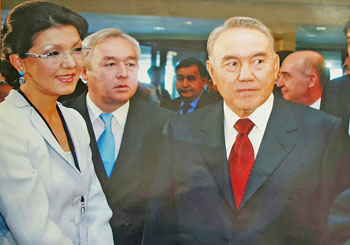 Free speech campaigners are crying foul over a criminal investigation in Kazakhstan involving two prominent media figures on charges of embezzling nearly $1 million.
Free speech campaigners are crying foul over a criminal investigation in Kazakhstan involving two prominent media figures on charges of embezzling nearly $1 million.
Seytkazy Matayev, head of the Union of Journalists and president of the National Press Club, and his son Aset Matayev, director of the KazTAG news agency, have been questioned over the embezzlement of some 340 million tenge ($970,000) in public funds between 2011 and 2015.
Details of the case were released on February 22 by the state’s National Bureau for Counteracting Corruption in a statement, which said that investigations are ongoing into whether another 169 million tenge ($480,000) allocated by local government bodies had also been stolen.
The statement accused Seytkazy Matayev, a well-respected figure on Kazakhstan’s media scene, of embezzling the funds and of tax evasion to the tune of 327 million tenge ($934,000), but did not name his son. The charges carry a jail term of up to 12 years.
The money was allocated by the government’s Information Technology Committee and state-owned telecoms company Kazakhtelecom for the publication of material publicizing their affairs, the anti-corruption bureau said.
The two categorically deny the accusations. “We openly state that we have not broken the law and have not stolen budget funds,” they said in a statement published on the website of the Adil Soz (Free Speech) watchdog.
Aset Matayev told EurasiaNet.org that he believes the charges are politically motivated and designed to get hold of valuable real estate owned by his father. The property includes the premises of the National Press Club on one of Almaty’s smartest thoroughfares, Furmanov (where the cost of real estate is stratospheric), and offices in Astana. It would all be subject to confiscation if Matayev were convicted of embezzlement.
The corruption probe was instigated by “highly placed people pursuing the mercenary aims of seizing my father’s property and closing our mouths so that we don’t publish [controversial] information,” Aset Matayev said by telephone on February 22.
He declined to name the influential people he alleges are at the root of the investigation, but said that he does not believe President Nursultan Nazarbayev is involved.
Aset Matayev was speaking shortly after being released from police custody following interrogation, while his father remained in detention. The two were hauled in by anti-corruption police shortly before they were due to address a press conference in Almaty.
The press conference went ahead in the Matayevs’ absence, with free speech campaigners alleging that the case is a bid to muzzle the independent media.
The “massive attack” on the Matayevs is a result of “critical publications” on KazTAG, said Tamara Kaleyeva, the head of Adil Soz. “I think they have offended some big, influential people.”
Adil Soz posited in a statement that the true goal was to get rid of the National Press Club as a platform for open dialogue, to strike a blow at the Union of Journalists and to establish “unspoken state control” over KazTAG’s content. The latter is an odd charge since KazTAG’s reporting tends not to be particularly controversial.
The National Bureau for Counteracting Corruption hit back, claiming the allegations were aimed at “avoiding criminal responsibility and obstructing the objective course of the investigation.”
The case hinges on a system known as the “state order,” by which government bodies pay selected media outlets millions of dollars a year to carry reporting on topics of their choosing, generally — according to research published in 2013 — to produce positive spin and promote a feel-good factor.
The anti-corruption bureau alleges that the terms of contracts with the National Press Club and KazTAG were breached because the material was supposed to be carried in the public domain but was not (implying that it was published for subscribers only).
In their statement, the Matayevs said that KazTAG had accounted properly for all funds received from the state, and the National Press Club had never received any.
EurasiaNet.Org, 22.02.2016




